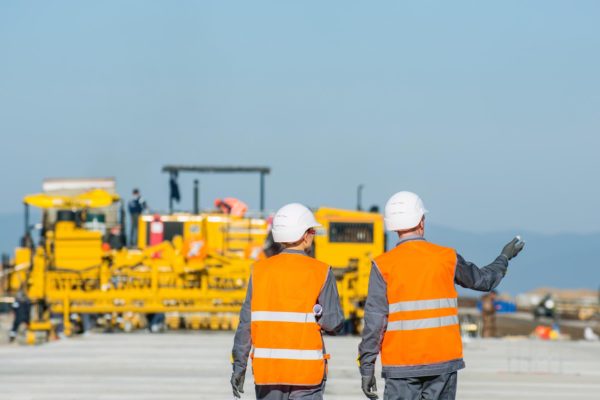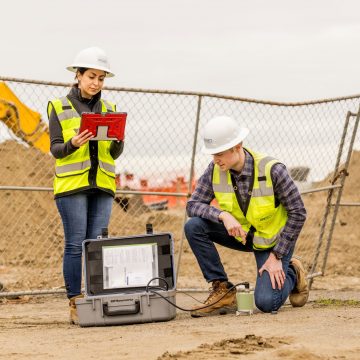Why Working With a Geo Tech Engineer is Important for Complicated Building And Construction Tasks
Why Working With a Geo Tech Engineer is Important for Complicated Building And Construction Tasks
Blog Article
The Interdisciplinary Approaches in the Geotechnical Industry: Connecting the Void In Between Engineering, Geology, and Environmental Science for Optimal Task End Results
The assimilation of design, geology, and environmental science within the geotechnical sector is not just useful; it is necessary for attaining optimum project outcomes. What approaches might emerge to promote this crucial collaboration and enhance the efficiency of geotechnical techniques?
Relevance of Interdisciplinary Collaboration
The significance of interdisciplinary collaboration in the geotechnical industry can not be overemphasized. Reliable geotechnical tasks require the integration of diverse competence from numerous areas, consisting of design, geology, and ecological scientific research. This cooperation guarantees that all facets of a task are taken into consideration, resulting in detailed solutions that address complex difficulties.
When working in isolation,Interdisciplinary partnership cultivates innovation by allowing experts to share understandings and approaches that might not be apparent. By leveraging the strengths of multiple techniques, groups can determine prospective dangers, optimize layout processes, and boost the sustainability of geotechnical tasks. In addition, such cooperation advertises an alternative understanding of site-specific conditions, which is important for precise analysis and decision-making.
The complexity of geotechnical jobs necessitates a worked with method to problem-solving. Inevitably, interdisciplinary collaboration is crucial for advancing ideal practices and attaining excellence in the geotechnical industry.
Secret Duties of Each Technique
Partnership amongst various self-controls is not simply useful; it is essential for the effective implementation of geotechnical projects. Each self-control-- design, geology, and ecological scientific research-- plays a distinctive yet interconnected duty that contributes to project efficiency and sustainability.
Geotechnical engineers are largely accountable for creating foundations and ensuring structural stability. They evaluate soil and rock residential or commercial properties to evaluate load-bearing capabilities, providing important data for safe construction practices. Their know-how allows the solution of cutting-edge options to intricate obstacles.

Environmental researchers analyze the prospective impacts of building and construction on ecosystems and water sources. They perform environmental evaluations and create mitigation approaches to decrease negative effects. By incorporating eco-friendly considerations, they guarantee compliance with policies and advertise sustainability throughout the job lifecycle.
Study of Successful Integration
Effective integration of geotechnical techniques can be exhibited with numerous study that highlight the performance of teamwork in addressing complicated engineering difficulties. One notable instance is the construction of the Hong Kong-- Zhuhai-- Macau Bridge, where a joint method entailing geotechnical engineering, geology, and ecological science was important. Engineers and rock hounds worked in unison to assess the seabed conditions and optimize the structure style, guaranteeing stability and lessening ecological effect.
One more impactful situation is the improvement of incline stability in the San Francisco Bay Location, where an interdisciplinary team incorporated geotechnical analysis with environmental evaluations. By integrating geological surveys and hydrological studies, the team efficiently recognized potential landslide threats and carried More Info out effective reduction procedures, improving safety and security and sustainability.
Moreover, the redevelopment of Brownfield sites usually the original source needs a multidisciplinary approach. In one situation in Chicago, collaboration amongst geotechnical engineers, ecological scientists, and city organizers caused the effective removal of contaminated dirt, enabling for the risk-free makeover of the website right into a community park. These study illustrate that interdisciplinary partnership not just addresses technological difficulties yet additionally fosters innovative services that profit both tasks and communities.
Obstacles in Multidisciplinary Projects

In addition, coordinating schedules and operations amongst different groups can be bothersome, specifically when each discipline has unique job landmarks and deliverables. This misalignment can result in delays and boosted costs. The obstacle of source allowance also looms huge; making certain that customized expertise is available at vital times requires mindful planning and foresight.
Finally, governing conformity positions another significant difficulty. Each self-control may deal with various regulative frameworks, and lining up these needs to fulfill task purposes can be intricate and taxing. Resolving these obstacles necessitates strong management and reliable interaction techniques to foster collaboration and ensure that multidisciplinary teams work cohesively in the direction of shared objectives.
Future Trends in Geotechnical Practices
As the geotechnical market progresses, arising trends linked here are reshaping practices to address the challenges encountered in multidisciplinary tasks - consulting engineer. One considerable fad is the increased integration of sophisticated modern technologies, such as expert system and equipment learning, into geotechnical evaluation and layout. These technologies enhance predictive modeling and risk evaluation, allowing designers to make even more educated choices throughout the task lifecycle

Moreover, the adoption of digital twins and real-time monitoring systems is becoming much more prevalent. These devices promote recurring evaluation of soil conditions and architectural performance, permitting for timely interventions when concerns arise.
Final Thought
In final thought, the assimilation of design, geology, and ecological science is vital for accomplishing optimal results in the geotechnical market. Effective instance research studies highlight the benefits of this approach, while recognizing the obstacles encountered in multidisciplinary jobs.
The combination of engineering, geology, and ecological science within the geotechnical market is not merely advantageous; it is vital for accomplishing optimal task results. Efficient geotechnical projects call for the combination of diverse knowledge from different fields, consisting of design, geology, and environmental science.Navigating the complexities of multidisciplinary jobs in the geotechnical industry offers numerous substantial difficulties.As the geotechnical sector progresses, arising patterns are reshaping methods to resolve the challenges encountered in multidisciplinary projects. Geotechnical designers are progressively collaborating with environmental researchers to ensure that tasks align with sustainability objectives and comply with governing requirements.
Report this page